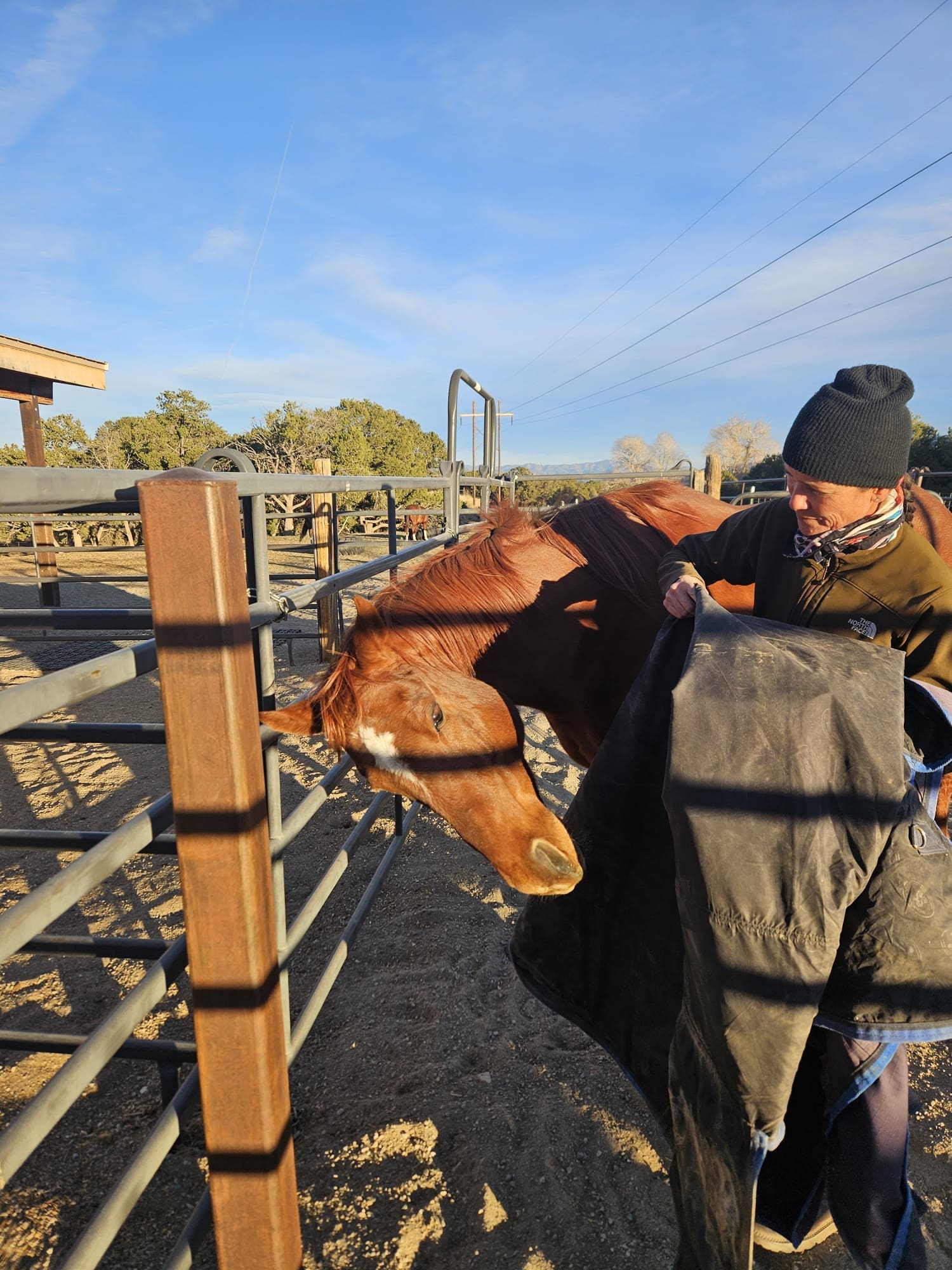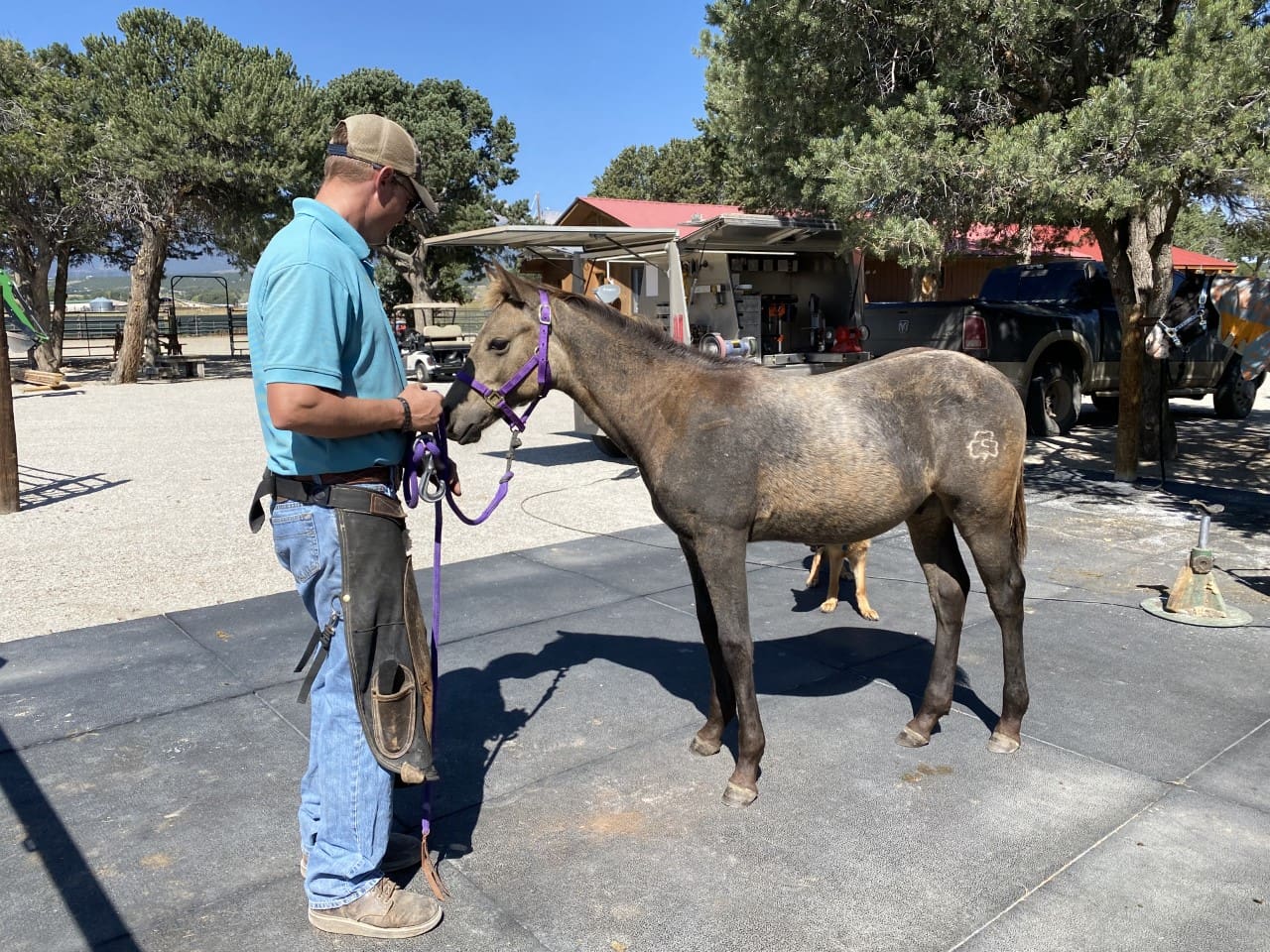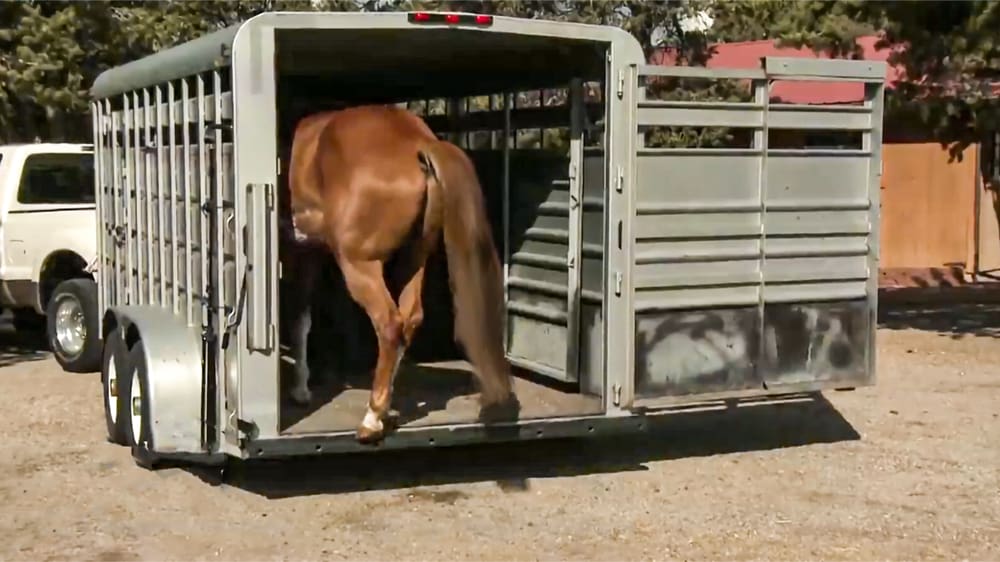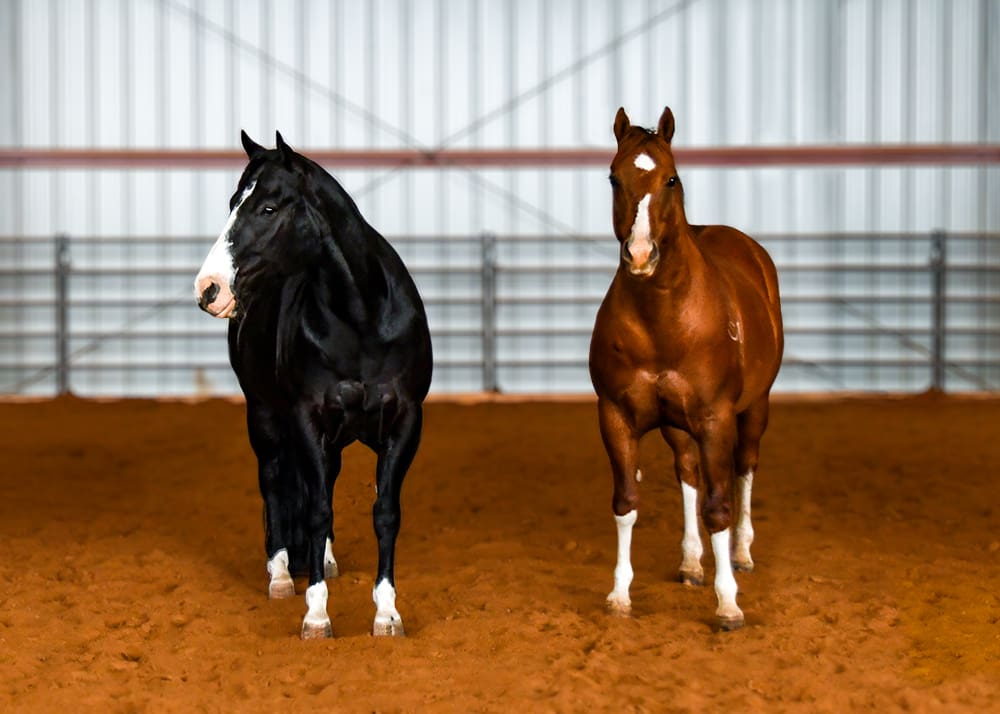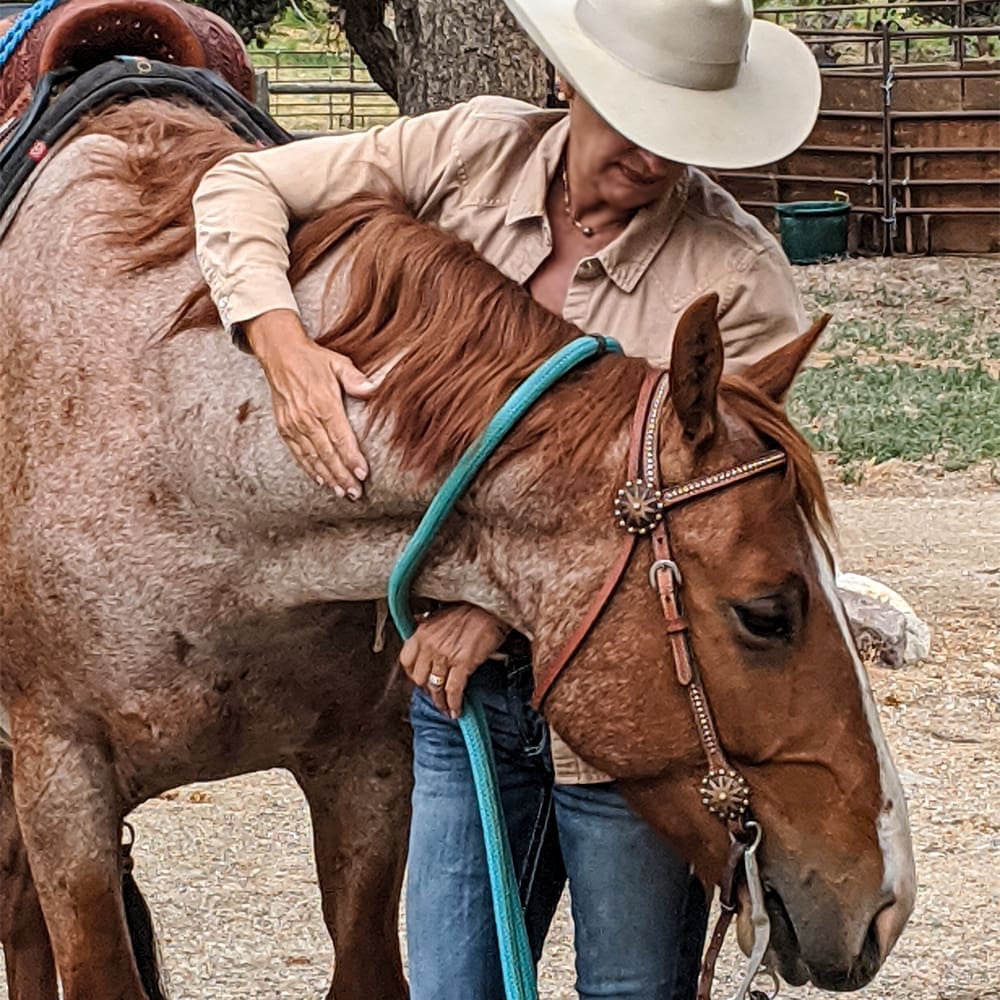
Recently I had a question from one of my podcast listeners, Benjamin. He asked:
“Many blogs, books and online training resources talk about helping you develop the relationship you always wanted to have with your horse. For example, having him meet you at the gate in the paddocks, etc. This makes me feel perhaps I should aspire to that as well.
My own horse tends to be aloof and keeps on grazing no matter where I am. I do feel we have a good connection when riding or on the ground. He trusts me and is very responsive. He is a 14-year-old Quarter Horse, who is a very sensitive, ‘hot’ type. So, is the fact that he does not run to greet me an indication that he sees me as any other ‘human,’ and I should work on developing that kind of relationship?”
Is it Me or My Horse?
As prey animals, horses are standoffish, skittish, and stoic by nature. While they are instinctively drawn to the herd and form strongly bonded relationships within, their affectionate behavior (non-reproductive) is not overt, and they often ignore each other.
Some horses are more interested in people than others, but whether this is a trait of their natural born temperament or a result of learned behavior, may be difficult to discern. Some horses are affable, friendly, and investigative by nature, but it’s not the norm. While these are highly desirable traits that can be honed by many positive associations with humans, it’s unreasonable to expect all horses to be that way, given the nature of prey animals.
Horses have strong instinctive drives, and they are also lightning-quick learners with a memory like a steel trap (important traits for prey animals). A horse with zero experience with humans would be naturally shy, but with only one encounter with humans, a horse could make a strong association, either positive or negative. This kind of learned behavior can make a horse eager to see you—or pretend you don’t exist.
For instance, if every time you approached a horse, you offered it a delectable treat, it wouldn’t be long before it was greeting you at the gate, eagerly anticipating your arrival—more accurately, the arrival of the treat. One should not mistake this behavior for anything other than what it is—acceptance of a bribe. Using food to reward a horse’s attention rarely works according to plan since horses establish dominance in the herd by taking away food from others. Still, this habit can result in a horse that eagerly awaits your arrival, but it will not create the kind of bonded relationship Benjamin is looking for.
On the other hand, consider a horse that has had repeated negative experiences with humans—either through strenuous performance training, having to work through pain, or being treated day-in and day-out for an injury or sickness. It doesn’t take long before the horse associates humans with negative emotions and avoidance behavior makes sense.
My new foster training project, a Thoroughbred mare called Truth, is a perfect case-in-point. After a decade as a broodmare, she’d learned that humans approaching her with a halter likely meant she would be put in stocks, twitched, hobbled, bred, or invasively palpated by a vet. Not surprisingly, every time we approached her pen, she would slink away and bury her head in the farthest corner of the pen—a clear message. Even though we had no such intentions, her associations were already there, and her reactions were reasonable. To change her behavior, I would need to change her associations.
Gregarious, Indifferent, or Depressed?
Since horses can be both subtle and overt in their communicative behavior, it’s important to distinguish between a horse that is gregarious, or indifferent, or depressed. Is the horse greeting you at the gate because he is interested in being with you and is looking for an adventure or because he views you as a giant cookie jar? As with any good sugar rush, it tends to be followed by a crash.
Some horses, perhaps most horses, tend to be seemingly indifferent to people and more stoic in their behavior, like Benjamin’s horse. This is far more common than the gregarious horse and should not be considered a negative trait. Sometimes stoic and aloof horses are the most tightly bonded to their humans, and often these horses are incredibly willing and dedicated to the cause.
It’s unreasonable to expect a horse to always look forward to your arrival just so he can carry you around on his back and work hard while entertaining you. It’s hard work, after all. In many cases, just accepting your presence, instead of beating feet the other way, is the best response you can hope for. Horses are much different animals than humans and we do them a disservice when we expect them to act in human ways.
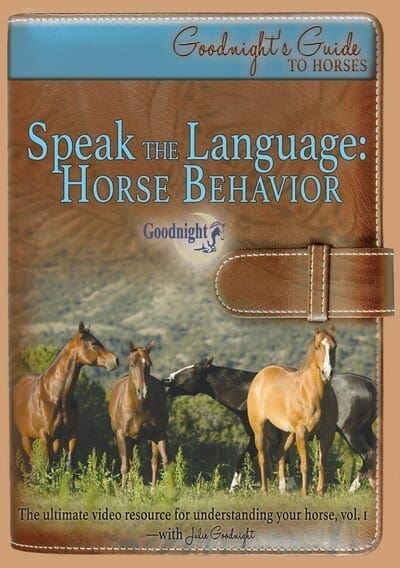
Speak the Language: Horse Behavior
The Ultimate Resource for Understanding your Horse
Learn the unique characteristics of a horse’s natural behavior so you are safer, more effective and can better relate to the needs of your horse.
However, when a horse has made negative associations with humans, its reaction may go beyond indifference to depression and rejection. The horse that actively avoids humans by slipping away to avoid capture, may be a horse that has negative associations with humans, or one that has learned clever tricks to avoid work. But a truly depressed horse will look much different.
A traumatized horse may be depressed and shut down to external stimuli. This horse may look dull, sad, and lethargic, acting as if he doesn’t know you are there, turning his buttocks toward you, or sometimes taking more extreme defensive actions, like kicking, biting, or fleeing. These behaviors may result from hard performance training, frightening experiences, or even abusive handling. A depressed and traumatized horse needs empathy, time, space, and new associations.
Reprogramming the Aloof Horse
Whether the horse is aloof and indifferent from negative experiences with humans, because of its stoic nature, or because it has learned clever tricks to avoid people, there are ways to reprogram the horse’s thinking and create new associations. Reverse psychology is often the key that unlocks the behavior you want.
Think about what happens when a new horse is introduced to an existing herd. Without exception, the new horse gets shunned, as if the existing herd mates are saying, “We don’t like you; you stink, you’re ugly, and we don’t want you.” But the new horse always comes back, begging for acceptance. In his mind, his very survival depends on being accepted into the herd. Unless and until that new horse shows willingness to be contrite, to accept the existing hierarchy in the herd, and to be a good citizen, he will not be accepted.
That is the natural order in the herd and the way horses are programmed to act. When people come along and are desperate for the horse to show them overt signs of affection (which may be unrealistic since they don’t show overt affection to each other very often) the horse often views this as abnormal and suspicious behavior. But if you play hard to get by ignoring a horse and acting as if he is not there, acting as if you are not interested in him, suddenly he’s all over you. Acting indifferent toward your horse will often make him more interested in you.
Be the Provider
When dealing with a naturally aloof horse, a horse that has had unfortunate experiences that led to disinterest in humans, or a horse that has not had exposure to humans at all, I always start with being the provider of basic needs and I put no demands on the horse. For a few weeks, with the horse in its own pen, I will be the sole provider of the horse’s basic needs—food, water, a clean and comfortable pen, a sense of security. I will ask nothing of the horse in return and make no effort to engage the horse—acting as if I have no interest in him. In time, the horse comes to associate the presence of humans with good things and will begin to seek more engagement.
I want the horse to have positive associations with people, but I don’t need him to act in a way that makes me feel better about myself or makes me feel loved. I think it’s unreasonable to expect a horse to validate my own personal need to be accepted, or to ask him for something he’s not capable of giving. I happily accept any interest he shows in me, I just don’t beg for it or become disappointed if he ignores me.
In time, that aloof horse will act much more interested in seeing me as he learns to associate my presence with good and necessary things. That’s my cue to take it to the next level. By now, he’s feeling secure—all of his basic needs are attended to, and he’s starting to look for more engagement. Taking the horse out of his pen to go for a walk, eat some green grass or meet the other horses will enrich his life. Now the horse is well on his way to looking forward to my arrival.

Grooming Tools
Make grooming time a bonding time with your horse
Two Can Play This Game
Once the horse has begun to show more interest in people, it’s time to actively reprogram the horse’s avoidance behavior. Whatever the reason for his lack of interest or active avoidance, he may have learned undesirable behaviors like walking away from you, turning his butt to you, or even defensive behaviors like threatening to kick or bite when you approach.
To reprogram the horse’s habitual behavior, I will employ a highly effective training technique called patterned conditioning. In other words, I will create a conditioned response in the horse (think Pavlov’s dog) by repeating a pattern over and over, releasing the pressure when I get the response I want. In the case of the horse that is avoiding me, it may look like this…
With a halter and lead in hand (no hiding it or using treats as a bribe), I will slowly approach the horse, displaying the most non-threatening posture I can—eyes averted, shoulders rounded, feet moving slowly, approaching the shoulder not the head. If the horse moves away, I follow, being careful not to increase the pressure (speed up or look more assertive) but not allowing the horse to get away from the pressure I am exerting with my approach. As soon as the horse stops and/or looks at me, I turn around and walk away—sometimes all the way out of the pen, completely releasing the pressure and rewarding the correct response.
I’ll give the horse a moment to think about what just happened, then I will approach it again, repeating the same pattern and turning and walking away as soon as the horse stops or shows interest in me. A horse always seeks a total cessation of pressure and turning and walking away is often the release it’s looking for. Soon the horse starts understanding that when he faces me, the pressure goes away. Before long, the horse is approaching me when I come into its pen.
A Tougher Nut to Crack
Because horses are lightning-quick learners, they often learn techniques to avoid capture and to make people leave them alone, like turning its butt and threatening to kick when you approach. It’s just a clever ploy, and I would certainly not take this personally or as an insult. It’s important to keep my own emotions out of it.
When a horse has learned to turn his butt and threaten to kick as I approach, I will step up my game a bit by irritating him when he turns tail and leaving him alone when he faces. With my halter and lead in hand, and from a safe distance in case he does kick, I will toss the halter at his rump when he turns his butt to me, then reel it back in and toss it at him again. This will bother him and at some point, he’ll turn toward me to reassess. At that moment, I will walk away, rewarding the horse for turning toward me. With a lot of repetition, I will pattern a new response in the horse, wherein he faces me every time I approach.
The hard-to-catch horse in a paddock or pasture has learned a clever game of outwitting humans. Sometimes it’s less about the capture and more about controlling the actions of the human (a game horses love). I have a lot of resource material about my techniques for reprogramming this type of behavior, with a method I call “walking the horse off.” It works 100% of the time and it teaches the horse that his clever techniques won’t work on you any more. If you need help with this, you can get more information in my online Training Library.
Accept Your Horse for Who He Is
Sometimes it’s hard not to take your horse’s reactions personally, especially when he seems indifferent to you or is actively avoiding you, but when you allow your emotions and your human expectations to get involved, you do a disservice to your horse. Taking the higher road, by having empathy and displaying leadership, takes the pressure off you and the horse.If what you want from an animal is undying loyalty and endless affection, you should consider getting a Golden Retriever.
Being patient and giving the horse time to change his point of view about humans, allowing the horse to come to a new understanding will give you a superior result. Learning to discern when you are controlling the horse’s actions and when he is controlling yours, will help prevent the horse from learning undesirable behaviors to begin with. Reprogramming the horse’s learned and habitual responses is not difficult when you approach it methodically.
I think Benjamin answered his own question perfectly by saying, “I do feel we have a good connection when riding or on the ground. He trusts me and is very responsive.” And Benjamin is right; he does have a great relationship with his horse and what more could he want? Accept the evidence before you and see your horse for who he is. Don’t let someone else define success for you, don’t place human attributes on a horse, and don’t expect him to be something he’s not.
By letting go of unreasonable expectations, by allowing your horse to be a horse, by taking the leadership role and not the needy role, and by occasionally employing clever techniques yourself, you’ll be amazed at how your horse’s attitudes will change!
